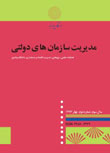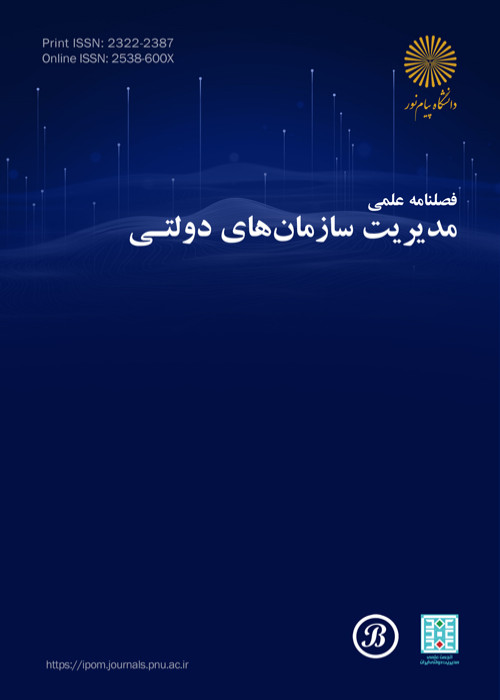فهرست مطالب

فصلنامه مدیریت سازمان های دولتی
پیاپی 1 (زمستان 1391)
- تاریخ انتشار: 1391/12/20
- تعداد عناوین: 7
-
-
صفحه 7کانون تمرکز بیشتر روش های موجود در مدیریت، بر مدیریت زیردستان استوار است. اندک مطالعاتی در باب چگونگی نفوذ زیردستان بر فرادستان انجام شده است. هدف غایی این پژوهش، فهم چگونگی چنین نفوذی و سپس، تبیین کمی آن است. بر این اساس، پژوهش در دو مرحله با عنوان پژوهش ترکیبی اکتشافی انجام شده است. در مرحله نخست که به صورت کیفی اجرا شده، نظریه فرایند نفوذ بر فرادستان بر اساس راهبرد داده بنیاد، تدوین و در مرحله دوم، نظریه حاصل به صورت کمی آزمون شده است. پژوهش حاضر از نظر هدف، کاربردی و از نظر روش، توصیفی- تحلیلی از نوع پیمایش است. ابزار گردآوری این مطالعه، مصاحبه (داده های کیفی) و پرسشنامه (داده های کمی) بوده و از جامعه آماری دو دانشگاه (تربیت مدرس و شهید چمران اهواز) جمع آوری و تجزیه و تحلیل شده است. نتایج پژوهش نشان می دهد که چیدمان استفاده از راهبردهای نفوذ عبارتند از: 1. مدیون سازی، 2. اعتمادسازی، 3. ائتلاف سازی، 4. وابسته سازی، 5. متقاعدسازی، 6. پنهان سازی و 7. شرطی سازی. همچنین می توان به تفاوت میان خودارزیابی و دگرارزیابی کارکنان اشاره کرد؛ به این صورت که استفاده از راهبردهای وابسته سازی و مدیون سازی را بیشتر به خود نسبت داده، استفاده از راهبردهای پنهان سازی و شرطی سازی را بیشتر به دیگران نسبت می دهند.
کلیدواژگان: قدرت، نفوذ، نفوذ رو به بالا، راهبردهای نفوذ، روش های نفوذ -
صفحه 23
توسعه و پیشرفت یکی از مهم ترین خواسته های جوامع مدرن است که صور مختلف از اوضاع اقتصادی، سیاسی، اجتماعی، فرهنگی و انسانی را ترسیم می کند. هدف اصلی مطالعه حاضر، شناسایی و تبیین نقشه راه برای تدوین و طراحی الگوی اسلامی- ایرانی پیشرفت با استفاده از فن(تکنیک) آینده پژوهشی است. روش تحقیق مطالعه حاضر، از نظر هدف، توسعه ای و از نظر روش، توصیفی با استفاده از دلفی است. جامعه آماری آن را مدیران و کارکنان بخشهای فرهنگی، اعضای هیئت علمی دانشگاه ها و اعضای جامعه روحانیت تشکیل می دهند که به روش نمونه گیری هدفمند انتخاب و تحلیل شده اند. همچنین ابزار گردآوری داده های این مطالعه، پرسشنامه است که در سه مرحله برای شناسایی و تبیین مولفه ها و شاخصهای الگوی اسلامی- ایرانی پیشرفت تدوین شد. یافته های پژوهش نشان می دهد که الگوی نهایی با توجه به روش آینده پژوهی دارای شش بعد (بهداشت جسمی و روانی، ثروت، دین، نسل، جامعه و عقل)، شش مولفه و 96 شاخص است. همچنین بیانگر آن است که یک انسان با توجه به الگوی اسلامی- ایرانی پیشرفت، از جنبه های مختلف دارای چه ویژگی ها و توانمندی هایی است.
کلیدواژگان: توسعه، پیشرفت، توسعه انسانی، آینده پژوهی، الگوی اسلامی، ایرانی پیشرفت -
صفحه 39رفتار شهروند سازمانی، رفتارهای فرانقشی و خودجوش است که کارکنان را در وضعیتی قرار می دهد که به صورت داوطلبانه فراتر از انتظارات، وظیفه و شرح شغل خود عمل کنند. هدف اصلی این مقاله، بررسی و شناسایی ارتباط میان شخصیت و رفتار شهروند سازمانی کارکنان سازمان توسعه صنایع نفت و انرژی است. روش تحقیق حاضر از نظر هدف، کاربردی و از نظر روش گردآوری داده های توصیفی، از نوع همبستگی است. جامعه آماری این مطالعه را کارکنان کلیدی سازمان توسعه صنایع نفت و انرژی تشکیل می دهند که به صورت سرشماری (تمام شمار) نمونه آماری انتخاب و مورد ارزیابی قرار گرفت. همچنین ابزار گردآوری داده های این پژوهش، پرسشنامه است. نتایج تحقیق نشان می دهد که رابطه شخصیت و ابعاد پنچ گانه آن با رفتار شهروندی سازمانی معنی دار است. از بین ابعاد شخصیت، بعد ثبات عاطفی و با وجدان بودن از همبستگی قوی تری با مولفه رفتار شهروندی سازمانی نسبت به ابعاد دیگر برخوردار است و سپس بعد سازگاری، تجربه پذیری و برون گرایی به ترتیب با رفتار شهروند سازمانی رابطه داشته اند.
کلیدواژگان: شخصیت، ثبات عاطفی، سازگاری، با وجدان بودن، رفتار شهروندی سازمانی -
صفحه 53پاسخگویی و اعتماد عمومی، از کلیدی ترین مفاهیم در حوزه مطالعات مدیریت دولتی است. هدف اصلی این پژوهش، بررسی و شناسایی تاثیر پاسخگویی عمومی بر اعتماد عمومی شهروندان است. در این تحقیق، پاسخگویی عمومی به چهار بعد تعهد، تکریم، شفافیت و کنترل پذیری؛ و اعتماد عمومی به سه بعد اطمینان، درستکاری و خطرپذیری تقسیم شده است. روش تحقیق مطالعه حاضر از نظر هدف، کاربردی و از نظر جمع آوری داده ها، توصیفی است. جامعه آماری تحقیق را ارباب رجوع مناطق شهرداری کلانشهر قم تشکیل می دهند. برای جمع آوری داده ها از ابزار پرسشنامه استفاده شده است. نتایج این مطالعه، حاکی از تاثیر مستقیم و مثبت پاسخگویی عمومی بر اعتماد عمومی شهروندان کلانشهر قم است. همچنین، تاثیر پاسخگویی عمومی بر بهبود درستکاری، خطرپذیری و اطمینان شهروندان را تایید می کند.
کلیدواژگان: مدیریت دولتی، پاسخگویی عمومی، اعتماد عمومی، شهروند -
صفحه 75تحقیق حاضر یک پژوهش توصیفی از نوع کاربردی است که با هدف سنجش قابلیت نهادهای دانشگاهی برای تبدیل شدن به سازمان یادگیرنده انجام شده است. بدین منظور الگوی سیستمی مارکوارت شامل پنج زیرسیستم یادگیری، سازمان، افراد، دانش و فناوری، مورد استفاده قرار گرفت. فرضیه های پژوهش با استفاده از این پنج زیرسیستم طراحی شد. به منظور گردآوری داده ها، از روش پیمایش و پرسشنامه بسته با مقیاس هفت رتبه ای لیکرت استفاده شد.. نتایج به دست آمده نشان می دهد که تنها شاخص «توسعه شایستگی های کارکنان» از زیرسیستم «افراد» تا حدودی در دانشگاه مورد توجه قرار می گیرد. از طرفی، میانگین کل یادگیری سازمانی در دانشگاه، کمتر از حداقل قابل قبول است. در انتها، برای نیل به الگوی مطلوب سازمان یادگیرنده در کاهش شکاف بین دانشگاه مالک اشتر و الگوی مطلوب سازمان یادگیرنده، پیشنهادهایی ارائه شده است.
کلیدواژگان: سازمان یادگیرنده، زیر سیستم یادگیری، به اشتراک گذاری دانش، فرهنگ سازمانی
-
Page 7Most management researches focus on managing subordinates, but there are few research studies on upward influence. The purpose of this research is to determine and explain how this influence happens. This research has been done based on a mixed method with two parts (quantitative and qualitative). In the first step, qualitative methods have been deployed. Based on a qualitative method, we drew the package of upward influence strategies and then the results of qualitative methods were tested. Data gathering was done through interviews and questionnaires. The populations are from two universities (Tarbiat Modares University and Chamran University). Part of the results showed that strategies consist of (1) establishing indebtedness, (2) building mutual trust, (3) coalition, (4) building interdependence between manager and employee, (5) persuasion, (6) secrecy, and (7) conditioning. Some other results showed that self-assessment of influence behaviors is different from assessment of others. Also, establishing indebtedness is higher in self-assessment and the use of building mutual trust, conditioning, and secrecy is higher in otherassessment of influence behaviors.Keywords: Power, Influence, Upward Influence, Influence Strategies, Influence Tactics
-
Page 23
Progress is one of the most important and crucial requisites of modern societies which defines a variety of the economic, political, cultural, and social relations. The question about the criteria and indicators of improvement is investigated from different aspects and viewpoint. In the present study, the authors have first introduced the future study technique as one of the methods of codification of Iranian-Islamic Pattern. Then, based on the proposed method, the life style and humanity developments are proposed as a conceptual model. The final model contains the characteristics of a perfect human from the Islamic view point as well as the Iranian’s high content culture. The model was obtained by an initial image processing, using the future study technique and finally analyzing the outlined frameworks by specialists. In addition, the other available models for humanity development are also investigated throughout the analysis and the benefits of the present method rather than others are clarified. The final model contains 6 dimensions (physical and mental health, wealth, religion, indicators. It defines the complete set of characteristics and capabilities that a perfect man should hold from the view point of the Islamic- Iranian style.
Keywords: Development Islamic, Iranian Progress ModelMNB Humanity, Future Study -
Page 53Accountability and public trust are the key concepts in the field of political science and public administration studies. This paper examines the role of Public accountability in improving public trust of citizens. In this study, public accountability has four dimensions: commitment, respect, transparency, and controllability, while public trust has three dimensions: reliability, integrity, and risk-taking. This is considered an applied, descriptive and correlational study. Statistical sample consisted of the metropolitan municipal questionnaire.Findings indicated that the relationship between citizens and public confidence is to improveKeywords: Public Administration, public accountability, Public Trust, citizen
-
Page 65technology networks, the development of virtual banks and the private banking system in country have enerated high competition in our banking industry. The purpose of this article is the evaluation of e-banking performance based on balanced scorecard and fuzzy logic. The required sample consisted of Isfahan Melli bank. The main instrument for collecting research data was questionnaire. Its validity was confirmed by content validity and construct validity. The reliability calculated that the questionnaire was appropriate. To determine the importance of research process indicators, the Fuzzy network analysis was deployed. After determining the critical indicators through the combination of importance and performance indicators, the proposed solutions to improve electronic banking services were provided. Research results suggest that the functional status of electronic banking in branches of Melli bank in Isfahan in terms of the financial perspective, internal process customer growth and learning is satisfactory.Keywords: balanced scorecard, performance evaluation, fuzzy logic, electronic banking
-
Page 75The mission of this research is to evaluate and analyze the level of organizational learning in the Malek Ashtar University. In order to achieve this purpose, the systemic model of Marquart was selected. This model includes five subsystems: learning, organization, human, knowledge and technology. Using these five subsystems, the hypotheses were defined. In order to collect data, a closed questionnaire with a 7-point Likert ranking spectrum was deployed. The results showed that from human subsystem was nearly considered by learning level was less than the acceptable level. Finally some recommendations have been proposed to access desired state of learning organization and reduce current problems in Malek Ashtar Univers ity.Keywords: Learning organization, Learning sub, system
-
Page 87Islam is a comprehensive religion which is able to meet all human needs and human societies. Whatever guarantees human happiness and whatever promotes the evolution of human societies can be found in the literature and religious teachings. The objective of this paper is to investigate the size and components of the apparatus of public control, based on descriptive studies of Islamic texts and religious core. To achieve this goal, three hypotheses were formulated and the required data were gathered from the staff of governmental agencies. Cronbach's alpha coefficient was calculated for the survey questionnaire based ABC A high reliability. The functionality was measured and governmental employees of Isfahan. Results of the study's main hypothesis were related to indicators of research and statistics T. The normality and the level of significance were checked. All hypotheses have been confirmed which show commitment to Islamic values as well as the commitment to organizational and national values is high.Keywords: Control, commitment to Islamic values, commitment to organizational values, commitment to national value


